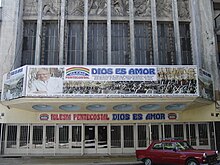Deus é Amor
The Igreja Pentecostal Deus é Amor (IPDA), sometimes referred to as Dios es Amor or Deus é Amor (God is love), is a Brazilian neo-charismatic Pentecostal church and fundamentalist sect . It is considered the first Pentecostal group to develop distinctive corporate structures.
history
The church "Deus é Amor" was founded in 1962 by David Martins de Miranda . Today it has almost 900,000 members and operates around 17,600 churches in Brazil and 136 other countries. In Brazil it is the second strongest Pentecostal church next to the Igreja Universal do Reino de Deus . In São Paulo , the Church of Miranda has a community hall that can accommodate 60,000 people. Their radio programs belong to the Voz da Libertação (Voice of Liberation) and are broadcast to other countries mainly via the Internet. The organization is financed by ten percent of the income that each member contributes and by other donations.
On the part of the Catholic Church, the IPDA is accused of a lack of morality:
“This is how he (Miranda) simply earns a living, realizing his lifelong dream of grandiosity. (...) Miranda uses the worst methods to get people to pay him - he pulls the last centavo out of their pockets. And people actually give everything they have, even those who don't actually own anything. But Miranda and his sect have no theological foundation, no morals, no respect for people's values. "
According to Lodemar Schlemper, the city missionary of the MEUC (Missão Evangélica União Cristão) in Blumenau, Miranda announced the return of Christ in 1999. When this did not happen, Miranda went to England with three million reais in church money (at that time around 1.5 million euros) and announced his resignation as head of the IPDA.
theology
The Church emphasizes the work of the Holy Spirit and divine miracles . Compared to conventional Protestant congregations, it is considered radical, and sometimes even extremist. Advertising banners (see photo above), on which countless wheelchairs and crutches are depicted, give the impression that the church has given hundreds of sick people a new life. David Miranda apparently brings the dead back to life in his sermons .
“The miracle healings involve trickery, all of which are pure stagings - crazy enough, it even wakes the dead again. He puts down a coffin, puts a supposedly dead bride in it, holds a wake - and then brings the bride back to life. "
The church advocates a theology of prosperity , a questionable notion that strong belief in God automatically leads to material wealth. In the expected event that prosperity does not materialize, it is suggested to people that their beliefs were not yet strong enough.
Faith Practice and Morality
The internal rules are very strict. It is forbidden to watch TV, football to play or make-up and jewelry to wear. Women are not allowed to cut their hair. Men are not allowed to wear a beard. The Catholic Church is branded as Satanic .
The church also recruits its lay preachers from among former serious criminals from Rio's favelas. These brag about their atrocities during the sermons and claim to have committed them through the influence of demons. For example, a man named Pastor Salles claims that he and his wife killed and ate their six-month-old child. Through contact with the IPDA, they are freed from their demons and have found contact with God.
“The darkest points of their biography make them a trump card, a spectacle - not only wanting to earn money in this way, but also social recognition and social prestige. (...) Murders and other horrific crimes are always blamed on the devil, he becomes a scapegoat. In this way, these priests present themselves as victims, deny their own guilt and responsibility for their deeds, and even act as victors and bearers of hope. "
Alleged money laundering
The purchase of another old and very large cinema in Montevideo, the Teatro Cine Plaza , for 4 million US dollars and high investments elsewhere have led to a lively discussion in Uruguay about the possible money laundering of the two large Pentecostal churches "Dios es Amor" and " Igreja Universal do Reino de Deus " triggered. They are accused of laundering large amounts of black money. A new law to control these powerful organizations is to be prepared.
literature
- Alexander Seibel : Brazil from North to South , 2000.
- Klaus Hart: Brazil's sect "Deus è Amor" and its mega temple in Sao Paulo , Sao Paulo, December 15, 2006.
Web links
- Official Website (Portuguese)
Individual evidence
- ↑ a b c d e f Klaus Hart: Brazil's sect "Deus è Amor" and its mega temple in Sao Paulo
- ↑ a b Wolfgang Behnk: With the plastic sword against demons - Brazilian Pentecostal movement (as of March 2007)
- ↑ http://espaco-vital.jusbrasil.com.br/noticias/3176114/envolvimento-de-convertido-em-assuntos-de-igreja-nao-gera-vinculo-de-emprego Pt. Retrieved January 29, 2013
- ↑ Alexander Seibel : Brazil from north to south
- ↑ Archive link ( Memento of the original from January 29, 2013 in the Internet Archive ) Info: The archive link was inserted automatically and has not yet been checked. Please check the original and archive link according to the instructions and then remove this notice. El Pais , Uruguay, accessed January 21, 2013
